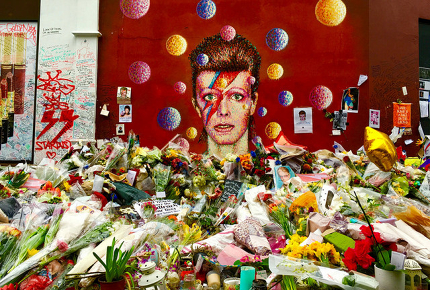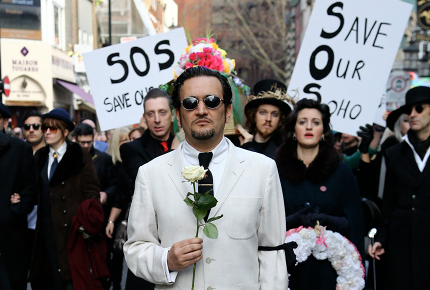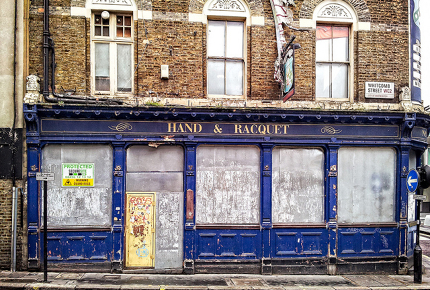Is London losing its soul?
London’s feted pubs, live music venues and independent shops are being replaced with bland flats and boring chains, turning a once-vibrant city into a monotonous metropolis. At least that’s what the critics think, but do they have a point? Gavin Haines reports.
Back in January, London led lachrymose tributes to one of its brightest stars, David Bowie, who lost his private battle with cancer aged 69. But as the flowers piled up outside his former home in Brixton, and on the steps of 23 Heddon Street, where he famously posed for the cover of The Rise and Fall of Ziggy Stardust…, was the capital also subconsciously mourning the city that made him?
Was it grieving for Denmark Street’s threatened music shops, where Bowie bought his first guitar (and where the Sex Pistols, Kinks, Rolling Stones and countless other bands recorded albums)? Was it growing teary-eyed for louche, libertarian old Soho, whose famously robust sensibilities were nevertheless scandalised by the musician’s flamboyance? And was it mourning rough-and-ready Brixton, the now gentrified district of South London, through which David Jones entered the world?
Perhaps. But cities change, especially mega cities like London. It’s what makes them so vibrant and vital. Change is inevitable, necessary. Change keeps things interesting. Nevertheless, there are growing fears that London, the world’s most visited city in 2015, is changing for the worse; that the English capital is selling out and slipping slowly towards a decidedly duller future.
 Flowers pile up outside the Bowie mural in Brixton
Flowers pile up outside the Bowie mural in BrixtonCreative Commons / Frankieleon
“London is full of people who know the price of everything, but the value of nothing,” says singer songwriter, Tim Arnold, who founded pressure group, Save Soho, in a bid to protect the entertainment district’s beleaguered live music venues.
Soho is frontline in a nationwide battle to protect live music venues from development. That battle hasn’t been going too well, particularly in London: the number of live music venues in the capital has plummeted by 40% in two decades.
There have been some high-profile casualties. Madame Jojo’s, the Marquee Club, the London Astoria, the Metro, the 12 Bar Club, the Velvet Club, the Hammersmith Palais, The Black Gardenia: all of these iconic venues have slipped into the history books.
There's more. Soho’s legendary Curzon Cinema is now in the crosshairs of Crossrail 2, and the future of Millwall Football Club is looking increasingly precarious as developers eye up Bermondsey.
 The Save Soho campaign mourns the city's live music venues
The Save Soho campaign mourns the city's live music venues Save Soho
The pub losses are too numerous to mention, although a handful have valiantly fought the tide of development. Other victims are smaller and more parochial, but nonetheless woven into the fabric of the city: Chariots, the gay bathhouse in Shoreditch that’s making way for a luxury hotel; Just William’s, the independent toyshop priced out of Herne Hill by Dulwich Estate’s 70% rent rise; and the Coronet Theatre in Elephant and Castle, which survived the Blitz but will be pulled down next year to make way for, yup, flats.
The Fat White Family, a London-based band chased out of Brixton by rapacious development, will play one of the last gigs in the Coronet next month. They let their feelings known in a recent Facebook post.
“Like every other decent London venue, the Coronet in Elephant will soon be deceased, no doubt some incredibly useful luxury flats and a Waitrose will spring forth in its wake, so worry not: as long as you're a minted yuppie c**t devoid of any aesthetic sensibility or cultural awareness whatsoever life gets sweeter every day!”
 Fat White Family play at London's 100 Club
Fat White Family play at London's 100 ClubCreative Commons / GanMed64
Blame the foreigners
Talk to any hackney cab driver and they’ll probably tell you the same hackneyed tale: with a housing market that promises high returns for overseas investors, the ensuing injection of yen, yaun, dirham and dollars into the capital has pushed up prices, pushed out Londoners and ripped the heart out of the city. In short: it’s the foreigners’ fault.
That’s partly true. The capital has indeed seen an influx of foreign investment and, much to the chagrin of Londoners, off-plan properties have gone on the market in China, Malaysia and Hong Kong before anyone in the city got a look in.
However, the problem is more complicated and less convenient than that. And it’s two-fold. Firstly, boringly, there simply aren’t enough properties in or around London to house the people who want to live there. Demand is outstripping supply and the pressure for housing (and, crucially, land to build it on) is immense. Think tanks claim we should be building on the green belt around London to ease the pressure, but the green belt is fiercely protected.
Conversely, London’s cherished cultural institutions, its pubs, clubs and independent shops, have very little protection from developers. And that brings us to the second problem: it’s simply too easy and too profitable to turn them into flats. They’re sitting ducks.
 London's cherished boozers are feeling the pressure
London's cherished boozers are feeling the pressureCreative Commons / Garry Knight
“We have policies that essentially allow commercial activities to be flipped to residential activities without planning permission – and residential values are always higher than commercial values,” says Andrew Carter, deputy chief executive at Centre for Cities, a non-partisan urban policy research unit. “[So] you get competition for space and displacement of non-residential activity, whether it’s commercial, cultural, open space or playgrounds.”
While these policies are in place, the pressure on London’s cultural institutions will remain, if not increase. However, it takes a lot to crush the resolve of the city’s hardy inhabitants, who were still dancing when the Luftwaffe were flying overhead.
Vociferous pressure groups like Save Soho, which has support from the likes of Stephen Fry, Benedict Cumberbatch and Paloma Faith, have enjoyed small victories in recent years – but they’ve been hard fought.
“Soho has been a national platform for edgy, innovative performers since the 1950s. But in its seventh decade, the one we find ourselves in now, The Astoria was demolished, The Black Gardenia was demolished, The 12 Bar closed and of course Madame Jojo’s closed,” says Save Soho founder, Tim Arnold.
“The good news about Madame Jojo’s is that since Save Soho made such a strong case about the importance of the club, the owners have announced they will now reopen it. We’re not looking for victories, but it does seem like quite a turnaround.”
 Read our interview with Save Soho's Tim Arnold here
Read our interview with Save Soho's Tim Arnold here
Save Soho
Down in Peckham, campaigners fought off a development that could have sounded the death knell for South London’s premier party hub, the Bussey Building. And elsewhere revellers are rekindling the punk ethos with pit parties: intimate, DIY gigs hosted in disused warehouses whose locations are only divulged hours before bands are due to play.
City Hall has also signalled its intentions to help arrest the decline in London’s live music venues. The capital’s mayor, the floppy-haired fop, Boris Johnson, threw his considerable weight behind a recent report, which called for new venues to be built in the capital and for the appointment of an Amsterdam-style night mayor who would champion the capital’s nightlife.
“Grassroots music venues have played a key role in enabling some of the biggest names in music to develop as artists and to build audiences,” he told London’s Evening Standard. “This timely report will shape our long-term action plan to safeguard and revive London’s vital network of live music venues.”
This, campaigners say, can’t happen soon enough, because except for the case of Buckingham Palace, nobody comes to London to look at other people’s houses.
“If the people who run London don’t respect its own cultural heritage, I will be visiting other cities in future,” said one of Save Soho’s American supporters. “Cities that do care about their culture and heritage.”
 The English capital must put more focus on its nightlife
The English capital must put more focus on its nightlifeoneinchpunch / Thinkstock
Can pit parties save London's live music scene?
London’s 12 best historic boozers
18 of the best live music venues in London
Do you have any Feedback about this page?
© 2026 Columbus Travel Media Ltd. All rights reserved. No part of this site may be reproduced without our written permission, click here for information on Columbus Content Solutions.









 You know where
You know where